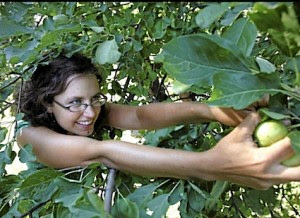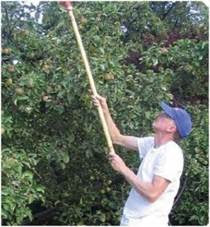San Francisco, CA (May 21, 2015) — National Public Radio’s The Salt digs deep for a story on the growing urban orchard movement across North American cities. Fruit trees produce food, but also provide shade, keep greenhouse gases out of the atmosphere, improve water quality and may even deter crime. They also have a longer lasting impact on communities than vegetable beds.
“When you plant lettuce, you produce food for today, which is great, but when you plant a tree, you’re feeding people tomorrow,” says Nina Beth Cardin, director of the Baltimore Orchard Project, a program of the Baltimore non-profit Civic Works. The orchard project has planted thousands of apple, serviceberry, pawpaw, fig and pear trees on public and private land around Baltimore.
Groups like the Portland Fruit Tree Project advocate for public access to existing fruit trees so that people can glean crops that would otherwise go uneaten — an idea some are calling radical. Other groups are more interested in planting new groves of fruit trees on previously fallow city land.
In Philadelphia, fruit trees have a special knack for bringing people together, says Phil Forsyth, executive director of Philadelphia Orchard Project. Since a large tree takes up space, communities are more likely to treat it as a public resource, with the crop harvested and shared among many people, Forsyth says.
Forsyth’s organization, founded in 2007, has helped plant nearly 40 orchards in and around Philadelphia and maintains a nursery stocked with small potted figs, cherries, mulberries and more. The organization provides these young trees to groups and individuals who apply for assistance to plant an orchard —and meet some basic criteria. Forsyth says applicants must have spaces with sufficient sunlight and soil, and must also have long-term property leases or ownership of their land.
Read the full article: “Urban Food Forests Make Fruit Free For The Picking”





